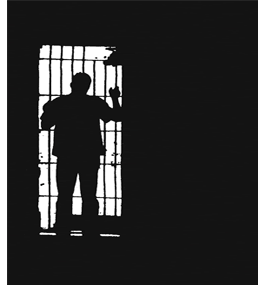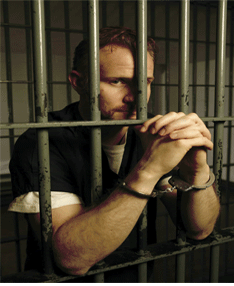
Islamic history provides some wonderful examples of prisoners welfare as far back as the seventh century, when sick prisoners were always tolerated and dealt with leniently. The west learned about the importance of “reformatory” prisons only in the 19th century.
 Rights of Prisoners:
Rights of Prisoners:
Geneva Convention Inspired by Islam
Geneva Convention forbids imprisonment of mental patients, as well as many other ethical practices which Islam had already come to institutionalize hundreds of years before.
The talk of a prison these days conjures up the image of
Such inhuman treatment is in sharp contrast to the humane treatment that was meted out to prisoners during the time of the Prophet (PBUH). In fact, Islam’s concern for the welfare of prisoners, their health and medical treatment as well as their human rights was the basis for institutionalizing such concerns in the Geneva Convention when it ratified in 1955 the rights of prisoners, including provision of medical care for them, and organizing health services, especially for the sick prisoners.
A flashback into Islamic history provides some wonderful examples of prisoners’ welfare as far back as the seventh century, when sick prisoners were always tolerated and dealt with leniently. The west learned about the importance of “reformatory” prisons only in the 19th century. Subsequently, international conventions made organizing medical mission in prisons an obligatory practice.
Islam sanctions the provision of imprisonment as a preventive-cum- punitive measure to punish those who go against its rules or transgress against others’ rights or property. However, it does not give it priority among other punitive measures, as is the case with the western law. It is rather a “preventive” measure that seeks to spare the family, society, country, and the prisoner himself, the negative aspects of imprisonment, including the psychological, moral, economic and social scars that it leaves on him/her. In fact, because of this negative impact, many countries actually favor the alternative methods to punishment.
Health Care for Prisoners
 Islam calls for monitoring the health of prisoners, to provide care for the sick among them, to monitor their condition regularly, and to treat them with respect. This can be gauged from the examples set by the Prophet himself and recorded in Islamic history. Once, we are told, a man by the name of Thumamah bin Athal was captured by the Muslims and brought to the Prophet’s mosque, where he was tied against one of its pillars. When the Prophet came out for prayer, he noticed that the man was ill. So he sat down beside him, talked to him, and learned that he was a leader of the Bani Hanifa tribe from the Al-Yamamah region. Because of his status the prophet instructed his companions to be kind to him, and to give him the best food and drink. They followed his instructions, and even milked the Prophet’s camel, the Qaswa’, to nourish the sick prisoner back to health.
Islam calls for monitoring the health of prisoners, to provide care for the sick among them, to monitor their condition regularly, and to treat them with respect. This can be gauged from the examples set by the Prophet himself and recorded in Islamic history. Once, we are told, a man by the name of Thumamah bin Athal was captured by the Muslims and brought to the Prophet’s mosque, where he was tied against one of its pillars. When the Prophet came out for prayer, he noticed that the man was ill. So he sat down beside him, talked to him, and learned that he was a leader of the Bani Hanifa tribe from the Al-Yamamah region. Because of his status the prophet instructed his companions to be kind to him, and to give him the best food and drink. They followed his instructions, and even milked the Prophet’s camel, the Qaswa’, to nourish the sick prisoner back to health.
History records that Ali bin Abi Taleb, one of the four rightly-guided caliphs of the period right after the Prophet, was always inspecting the prison of Al-Kufa city, and inquiring about the prisoners’ welfare. If this was the case with normal prisoners, he must have given extra care to the sick among them till they recovered.
Omar bin Abdulaziz, one of the caliphs of the Umayyad period, was known for his justice and his kindness. For this reason people called him the “fifth” rightly guided caliph. The historian, Ibn Sa’ad, mentions in his famous history book , Al-Tabakaat, that this caliph wrote to all his governors and emirs asking them to “look in your prisons, visit the sick among (your prisoners), and extend care to them”.
Mention may also be made of Al-Muqtader who ruled between the beginning and the middle of the fourth Islamic century. History records that his Prime Minister, Ali bin Esa Al-Jarrah, sent the following message to Sinan bin Thabit bin Qurrah, who was in charge of hospitals in Iraq at the time: “I have been thinking about the prisons…and the prisoners therein, among whom you will undoubtedly find the sick (and those who cannot care for themselves)…and find it necessary that you should appoint doctor(s) who check them everyday, and give them treatment…Let this be the case for all prisons…and let there be set aside special “Muzawwaraat”or treatment rooms for them..” Sinan carried out his instructions for the next 20 years.
A famous Qadi, or judge, by the name of Taj Addin Al-Sabaki, was prominent in the eighth Islamic century. He was a renowned reformist and was well-respected. He was also very keen on reforming prisons and the state of prisoners, as part of his effort to speed up social and moral reforms. Accordingly, he instructed that the sick among them should be accorded special care and attention, so that their sufferings could be relieved.
Another illustrious example is that of Qansu, one of the powerful rulers during the Mamluki era of
Muslim Tolerance of Sick Prisoners
As can be seen, sick prisoners were handled with great care and leniency. The prison management system at the time of Umayyad caliph, Hisham bin Abdulmalik, used to be very lenient in dealing with them. For example, it did not disturb their sleep during routine inspection of their rooms. Nor was it allowed to clamp chains on the hands of sick prisoners while they were moving from one place to another. They had freedom of movement in the different areas of the prison and were even allowed to pick flowers in the hope that this could speed up their recovery.
While the sick in Muslim prisons were extended full care and treatment, many prisons in other lands were like mass graves where heaps of prisoners were left in the most atrocious conditions, as documented by Encyclopedia Britannica and other references.
Some prisons were even the destination for the mentally and neurotically sick patients who were sent on the pretext that their condition was a curse from God and a form of punishment they deserve. They were, because of this, confined to dark and dingy rooms, where they endured floggings while still in chain. This situation continued until the end of the eighteenth century.
Even worse, the sun never illuminated the windows of the “Bastille” in
Reforming the Prisons
The conditions of prisons remained unchanged till the end of the 18th century, when a reformist movement swept across the world. It was only then that the west started to realize the role of prisons as a reformatory. Subsequently, it was made obligatory for prisons to be kept clean, and for medical care to be administered to all prisoners who needed it.
This reformist trend continued unabated until 1955 when a special international “Geneva Convention” ratified the rights of prisoners, including providing medical care for them, and organizing health services, especially for the sick. The Geneva Convention also forbids imprisonment of mental patients, as well as many other ethical practices which Islam had already come to institutionalize hundreds of years before.
This historical perspective of Islam and its respect for medical and other rights of prisoners provides a telling answer to the critics of Islam working overtime to portray it as a crude and barbaric religion. There was no